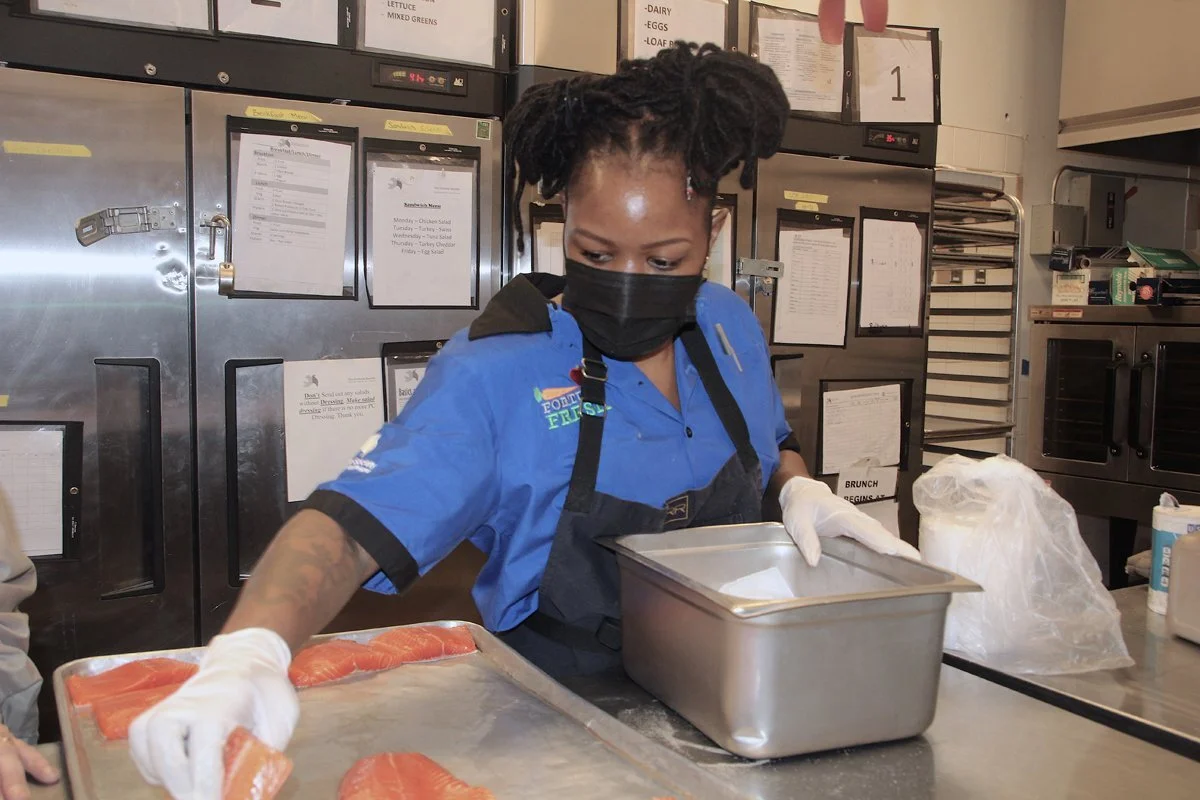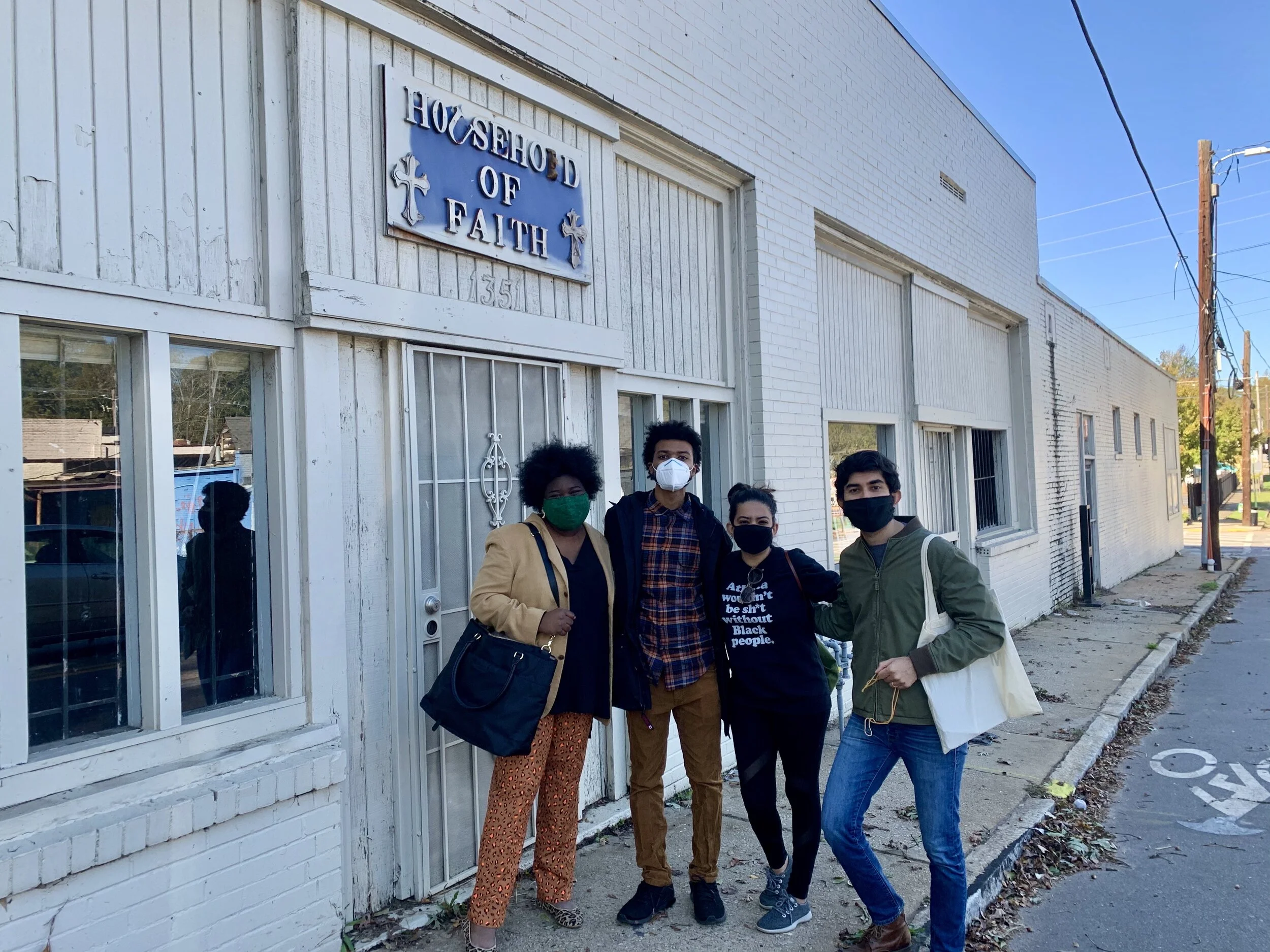Jubilee Market, a non-profit grocery store in Waco, seeks to provide affordable, nutritious foods in low-income neighborhood
By Sujata Dand, the Dallas Morning News, April 28, 2021
Word count: 1810
WACO — David Daniels checks the peppers and tomatoes for bruises. The produce manager knows his customers won’t buy them if they don’t look perfect. But, that’s OK. He takes the few he finds, cuts them up and puts them in small individual containers in the refrigerated section to sell.
“I’ll make fruit cups or vegetable cups,” says Daniels, 73. “Mine is $1.25, HEB is $4.50. These won’t be here tomorrow. They sell so fast.”
There’s no waste at Jubilee Market. The one-of-a-kind, non-profit grocery store, just 10 minutes away from Baylor University in North Waco, has attracted the attention of city leaders from across the state looking for innovative ways to provide affordable and nutritious foods in low-income neighborhoods.
However, Jubilee may be a unicorn, because it relies on a leader who lives in the neighborhood, a strong base of supporters and a financial safety net. And, even then, experts say it is only part of the solution when it comes to alleviating food insecurity.
Daniels grew up in this low-income neighborhood. He says Jubilee, which opened in 2016, is the first “real” grocery store for this community. Before Jubilee, Daniels says the nearest supermarket was an HEB that was two miles away. Without a car, he says the bus could take him a few hours roundtrip. So, he often paid family members to drive him.
“I get a welfare check that’s a little to nothing,” he says. “I got to pay my niece or nephew $20 to take me places. Then I have to call them to come pick me up, and then I give them another $5 or $10.”
Now he can walk to the store. He’s worked here since it opened four years ago. “We love it,” he says. The residents “send their little kids here with a note of what to bring home. Everyone knows me.”
Anga Sanders, an Oak Cliff community advocate, met Daniels a few years ago when she was visiting Jubilee Market. She remembers Daniels as being shy and reserved. The changes she has seen in him and this community have been remarkable. “Jubilee is kind of the model for community-based grocery stores,” she says. “It has had a transformative impact on the community.”
Sanders leads FEED Oak Cliff, a nonprofit dedicated to bringing healthy food to Southern Dallas. She is particularly interested in the Lancaster Avenue Corridor near the Veterans Hospital, an area that the U.S. Department of Agriculture defines as a food desert because the nearest grocery store in this low-income community is more than a mile away.
“There’s no justice in a food desert,” Sander says. “They don’t have sufficient access to healthy food. That’s a neighborhood that has significant health disparities in terms of cardiovascular disease, obesity, diabetes, stroke, all of that.”
She says she’s spent the last four years trying to recruit a corporate grocery store to south Oak Cliff, but hasn’t had any luck. So she’s decided FEED Oak Cliff would “build our own,” replicating Waco’s Jubilee Market model. Last month, she took her team to Waco.
“This is Jimmy Dorrell — the chief instigator,” Sanders laughs. Pastor Jimmy Dorrell is well-known for starting the Church Under the Bridge, a ministry for people experiencing homelessness, more than 25 years ago. He greets Sanders with a fist bump before starting his tour.
“This used to be a Safeway,” Dorrell points to Jubilee Market. “This neighborhood was a rich neighborhood back in the ’20s and ’30s, and as the Civil Rights thing happened in the ’60s, the Blacks began to move across the [Brazos] river, and white flight happened to the suburbs. So this neighborhood flipped. Instead of being a middle-class white neighborhood, it became a mostly African American neighborhood. When the business community left, poverty encroached and this became a pretty rough neighborhood.”
Dorrell, a Baylor graduate, describes how crime, drugs, and prostitution were commonplace when he and his wife Janet moved into the neighborhood with their young family more than 40 years ago. “Grandpa wasn’t too happy with me,” he jokes.
The couple bought a 4,000-square-foot house across the street from a dive bar for $12,000, raised four kids and have lived here ever since.
With a background in grant writing and program development, Dorrell and his wife founded nonprofit Mission Waco, which now funds 18 different programs inspired by the needs in the community — everything from an alcohol and drug rehabilitation program to a homeless shelter. The organization has an annual budget of $4.2 million.
“Everything that we’ve done in these last 43 years has happened a step at a time based on the needs of the community,” he says. “What they think is important becomes important to us.”
Over the years, residents have repeatedly asked for a grocery store. Safeway left the neighborhood in the ’60s. When the building came up for sale in 2015, Mission Waco purchased the property for around $130,000 with the hopes of converting it back to a grocery store.
Dorrell knew it was going to be challenging. Grocery stores are not very profitable. His research showed the profit margin for corporate grocery stores around this size was around 2 percent. Also, he didn’t have a model to follow. His team searched nationwide, but couldn’t find a similarly sized non-profit grocery store to replicate.
“Just the very idea of taking on a huge liability with such a small possibility of making it was really frightening,” he says. “How do you do [take the] appropriate risk? How do you do what’s smart? That will be one of the questions y’all will have to ask yourselves.”
He says the start-up costs were around $900,000 just to get the 6,400-square-foot building ready to go. They received some small grants from PepsiCo and Walmart, but the majority of their money came from individuals.
“We sold ‘stock’ in the neighborhood. Middle-class people bought some. Chip and Joanna [Gaines] bought some,” he says, referring to the TV personalities best known for Fixer Upper. “Eight-five to 90% of the money we raised came from individuals. People who believe in us.”
“Shareholders” get quarterly reports on how the market is doing, invitations to annual meetings, and a discount card. Dorrell says it was important that community members felt like stakeholders, and that their voices are heard.
Once the building was ready, the next challenge was meeting financial expectations. The market would have to sell $60,000 in goods a week to break even. Dorrell says that meant that the two nearby neighborhoods of more than 400 regular shoppers couldn’t support the store alone. People from the wider community would have to shop there, too.
His research revealed that if people outside of the neighborhood shopped at Jubilee Market once every two to three weeks, the grocery store would reach its financial goals. So he created a public awareness campaign encouraging the greater Waco community to shop at Jubilee Market.
The first week the store was open, it sold $24,000 in goods. By the third year, Jubilee was routinely selling about $50,000 a week. Over time, Jubilee was able to negotiate better prices with grocery store suppliers so that their costs were comparable to big chain stores.
Dorrell says they also cater to their diverse customers — a third of the neighborhood is Black, another third is Latino, and a third is white — by selling cactus and peppers, and specialty items like oxtail and pig’s feet. “Well, I’ve never had a pig ear in my life, but that’s a big deal in this neighborhood,” he says.
The pandemic temporarily increased sales, but even with a very lean, targeted approach, Jubilee falls financially short. Mission Waco makes up the 10% to 15% difference for the store to break even.
Dorrell says Mission Waco’s board of directors hopes that Jubilee will be self-sustaining, but they will continue to cover the gap because they believe the supermarket is improving the health of the community. “After living in this neighborhood for the last 43 years, this project has brought me the most joy because it has met a basic human need,” he says.
Epidemiologist Kelly Ylitalo, a professor of public health at Baylor University, has been studying Jubilee Market customers since 2017. She says having a grocery store in the community is only part of the solution to combat food insecurity.
After surveying nearly 400 customers who live near the store, Ylitalo learned that almost 80% of them reported that the food they bought at the store didn’t last for the month, and they didn’t have money to buy more.
“Poverty is a huge problem,” Ylitalo says. “Access to healthy foods in a low-income community is only part of the solution.”
Ylitalo says that to have a healthy, productive society, there are a number of economic, social and physical factors. This can include a grocery store that offers affordable and nutritious food, but it also includes safe and affordable housing, job opportunities that have a living wage, and safe neighborhoods with sidewalks for walking and access to public transportation.
“All of these things impact how we live, learn, work, and play — and thus they all impact our health,” Ylitalo says.
David Daniels believes his neighborhood is changing with the addition of the grocery store. He points to the new pedestrian crosswalk and lights that weren’t there a few years ago. He also says there’s less crime in the neighborhood because “the mamas and grandmothers tell their kids, ‘don’t go messing with that store.’ "
Jubilee now anchors a small shopping center. Across the street is the World Cup Café and down the street is a new Mexican ice cream shop and a trendy neighborhood coffee shop where Baylor students study while sipping their lattes.
Cornerstone Baptist Church in Dallas hopes to create a similar environment in their neighborhood off of Ervay Street and Martin Luther King Jr. Blvd. Dorrell says Pastor Chris Simmons is very similar to himself, and has the best chance to succeed because of the trust he’s built in the community.
Cornerstone’s Southpoint Market, a small neighborhood grocer, is scheduled to open in the next few months.
Sanders says her team was excited by Jubilee and all of its surrounding development, but also overwhelmed. “Dallas is not Waco,” she says, comparing Waco’s 130 thousand population to Dallas’ 1.3 million. Still, Sanders has hopes of creating a nonprofit supermarket in South Oak Cliff in the next couple of years. “There are a lot of moving pieces,” she says. “Assembling the right team, locating the right property, obtaining funding, and dealing with the zoning and the city’s regulations. There’s a lot.”
Dorrell says he’s had community leaders from Houston, Austin and San Antonio visit in hopes of replicating his store, but so far no one has done it.






